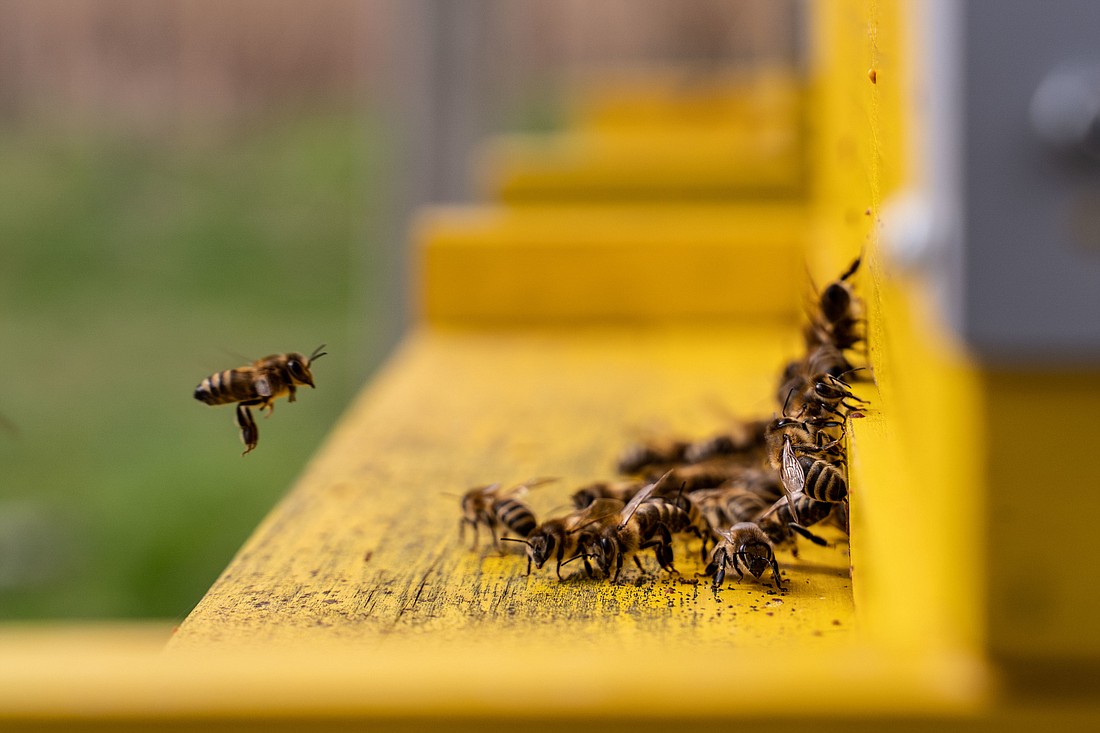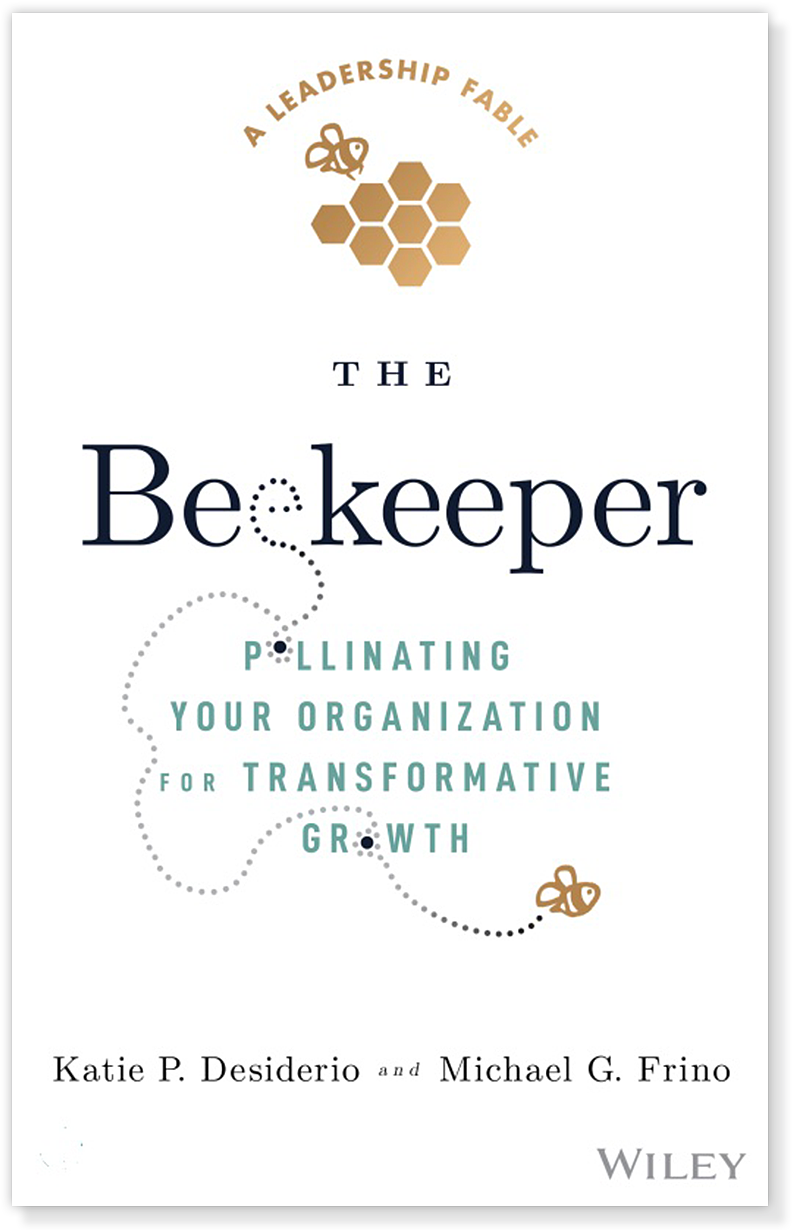- July 26, 2024
-
-
Loading

Loading

May 20 wasn’t just any Saturday for Naples resident and leadership consultant Michael Frino and his leadership development co-author Katie Desiderio.
For one, that day the pair found out their new book, “The Beekeeper: Pollinating Your Organization for Transformative Growth,” published May 2 by Wiley, had become a Wall Street Journal best seller. And, fittingly, May 20 is United Nations World Bee Day, created in 2018 to “raise awareness of the importance of pollinators, the threats they face and their contribution to sustainable development.”

The idea for the book, a leadership fable that tells the story of how a CEO uses the world of bees, honey and pollination to revamp her company’s culture, pre-dates World Bee Day. It actually goes back more than a decade, to 2011, when Frino and Desiderio were in graduate school, obtaining their doctorate degrees in Organizational Learning and Leadership. The idea for "The Beekeeper," they say, or a way to express their leadership teachings in easy-to-digest morsels, was born back then — on the back of a pizza box.
While they went forward on their careers, including teaching stints at Barry University in Miami, they kept returning to the practical side of what they do and the idea of a book. “How do we get people to go from the theory to action has long been the north star of our writing,” says Desiderio, who is based in Pennsylvania and an associate professor of management at Moravian University’s School of Business and Economics.
The star of "The Beekeeper," though she’s technically not a beekeeper, is Catherine, CEO of Essentially Proximal. The company is in the diffusing and essential oil business, and, Catherine notes in the book, is “growing faster than it could adapt.”
Catherine starts the book infused in stress: she holds a town hall-style Q&A for employees, who lament that the firm’s rapid growth is causing the company to lose its startup vibe and culture. That’s been followed by a drop in customer service — a rather common challenge business growing quickly face. “We had people leave our company and tell us they felt less connected to our mission and values that we held dear to our company — recognition, reflection and connection,” Catherine says.
Yet by the end — spoiler alert — Catherine becomes a transformational leader she aspires to be. She does that by going on a family vacation with her husband and two young daughters, to a working farm named the H. Ives Family Farms. It’s there where Catherine meets Henry, the owner of the family business and resident beekeeper.
Catherine learns some valuable leadership lessons from Henry and her family vacation experience at the farm.
The lessons, also names of chapters in the book, are relevant advice for a leader at any stage of their career. The list includes:
Take the time to notice what’s around you and be open to people you might not encounter every day. That’s what happens when Catherine meets Henry for the first time, when the farm owner is decked out in full beekeeper attire. “Sometimes you can get so focused on your goals,” Desiderio says during a recent Zoom call. “Don’t forget to be curious about others.”
Vulnerability in leadership is talked up so often, I think, it runs the risk of being oversaturated. But Frino, an executive in human capital development with Boston Scientific and former senior sales consultant in Southwest Florida with pharmaceutical giant Novartis, says vulnerability is his favorite leadership principle in the book. That’s mostly because it provides a way for leaders to help teammates be more comfortable with getting uncomfortable and trying new things. In the book, Henry uses recently sheared sheep, now bare, to show why vulnerability is important. The bare sheep, he points out to the vacationing families, “will get a chance to grow a new coat and feed the pastures this summer,” he says.
The authors add: “Showing vulnerability in front of a group opens the door for more authentic conversations.”
A tour of the pig pen provides another lesson, in the ability to deal with setbacks, challenges and obstacles. For the pigs, the farmer points out that they “play in the mud to cool off. The mud prevents them from overheating when it is hot outside.”
Catherine takes it further, in an email to her leadership team. “There are a lot of times life gets messy and we need to find creative ways to cool off and continue to flourish.”
It’s one of the shortest chapters in the book, but for leaders like Catherine looking to transform teams and organizations, it’s pertinent. The farm has a lake, and it follows that fishing — few pastimes require more patience — is one of the daily activities. Catherine and Tom’s daughters struggle, at first, with fishing lines and poles. But the parents and guide tell them: remain focused on what you are doing. Stay calm. “Don’t let something pull you down, causing you to get all tangled up,” Catherine writes in an email to her team at the end of that chapter. “There are rich returns when you can be patient.”
Following a day of fishing was horseback riding. This one, focusing on how horses can sense fear and anxiety, also known as pheromones, is my favorite of the ‘be’ principles. That’s because it deals with a key component of great leadership in challenging times: when stuff hits the fan, the leader of the team has to maintain composure and a level-head. If not, you are only adding to the problem. Catherine sums it up in an email to her team: “Be calm in times when the environment around you may be causing anxiety or stress. People can sense when something is off and may communicate those feelings to others, causing an unwanted rippled effect.”
At several points in the book, Henry, who also has an interesting backstory, related to the founding of the farm, talks about the center of the farm. It’s a metaphor but it’s also geographical: the heart of the farm, what he calls the “proximal location,” is a spot that extends 1.5 miles in every direction. Henry chose that spot since bees can generally travel three miles to feed and pollinate, and then end up at the most proximal part.
Catherine picks up on that philosophy. And that’s not an accident, says Frino. Just like the name of her company, Essentially Proximal. Is not an accident. “As a leader, you are in the center,” of your company or organization, Frino says. “The heart is where everything happens with your leadership.”
There are other principles Catherine learns about, or relearns in the book — be energizing, be growth-minded and be appreciative among them. All together, with those themes at the center, the authors say they hope the book resonates not just with people in the C-suite but teachers, school administrators and more. “We want people to use this as a playbook,” Frino says. “There’s a lot of buzz going on about it right now.”